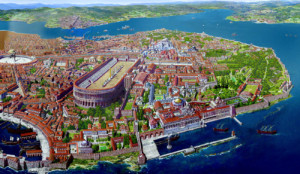Western Mentality and Eastern Morality: Part II
Around the time of Charlemagne, who was crowned Holy Roman Emperor in 800AD, Western Europe was in a state of confusion and feudalism.
Western Europe was going through the Middle Ages (also known as the Medieval period). During this period, war was the usual state among the countries of Europe, and this prevented any significant social, spiritual, scientific, or educational progress. As a result, the people remained largely illiterate and leading a mostly agrarian life. The Middle Ages are generally accepted to have lasted from the 5th to the 14th Century, and were succeeded by the Renaissance, spearheaded by education, philosophy and technical advances.
Whilst all the above were taking place in Western Europe, the Eastern Roman Empire with its capital in Constantinople was flourishing in many aspects that were deficient in the West. The Latin and Greek languages were both spoken, as in all polyethnic Empires, where more than one language were commonly used. There was a predominance of Greek residents, a fact which made Greek the dominant language, and Latin was eventually abandoned in the 6 th Century, after it had ceased to be the official language. At the same time, the Empire was the centre of power and wealth, and this led to the development of art, social improvement, education, and the establishment of scientific Institutions. Culture, language and art were mainly Greek, with a moderate degree of Roman influence.
Controversy arose as to whether the Eastern Empire was Roman or Greek. The historians finally settled that it was Roman. Its citizens were called Romaioi, [Ρωμαίοι], and they are called “Rum” in Turkish and Arabic today, and their country Romania [Ρωμανία].
Following the fall of the Western Roman Empire in 476AD, friction began about the 6th century between the Eastern and Western churches. The Church in Rome introduced into the Nicaean Creed the word “filioque”, meaning that the Holy Spirit can proceed both from the Father and the Son. To the East that was totally unacceptable, as one of the canons protecting the Creed declares “no word can be added to or subtracted from it”, and it clearly states that the Holy Spirit only proceeds from the Father. Only an Ecumenical Synod could make any change, but the Western Church had done it without any form of consultation, excluding even the other four patriarchs. Negotiations proved futile, and Rome eventually inserted “filioque” permanently into its creed in the 9th century.
Since then, changes in many aspects of dogmas and teachings have been made by the Western Church, opening the way for the Protestant world to do the same to its dogmas and teachings. The final result was that both denominations adopted the path of revisionism and relativism [changing dogmas to fit ideas of the world], rather than the firm and immovable truths of the Bible, the Ecumenical Councils, and the holy Fathers of the Christian faith.
Source: Lychnos April – May 2021

